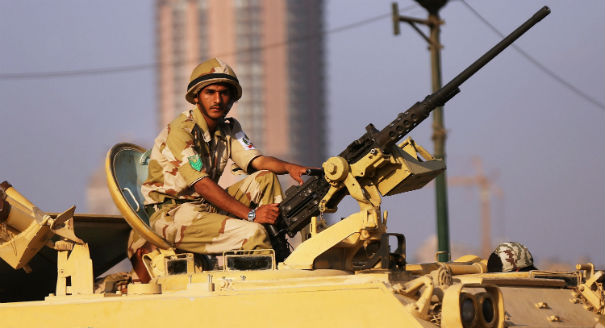Stephen Tankel
{
"authors": [
"Stephen Tankel"
],
"type": "legacyinthemedia",
"centerAffiliationAll": "dc",
"centers": [
"Carnegie Endowment for International Peace",
"Malcolm H. Kerr Carnegie Middle East Center"
],
"collections": [
"Arab Awakening"
],
"englishNewsletterAll": "",
"nonEnglishNewsletterAll": "",
"primaryCenter": "Carnegie Endowment for International Peace",
"programAffiliation": "SAP",
"programs": [
"South Asia"
],
"projects": [],
"regions": [
"North Africa",
"Egypt"
],
"topics": [
"Political Reform",
"Security",
"Democracy",
"Military",
"Foreign Policy"
]
}
Source: Getty
The Egypt Aid Dilemma
Egypt’s generals appear to have calculated that, for a number of reasons, Washington will not suspend military assistance and that, if it does, this is a bearable cost in order to achieve other more immediate, and important, interests.
Source: National Interest
As Egypt is convulsed by violence, Al Qaeda celebrated its twenty-fifth anniversary this past weekend. United States counterterrorism efforts, heavily reliant on missile strikes from unmanned aerial vehicles, significantly degraded the bulk of Al Qaeda’s core organization located in Pakistan. But the uprisings that roiled the Arab world enabled a jihadist expansion across the region, thereby creating new threats to U.S. interests from Al Qaeda affiliates and associated movements. Promoting democratic inclusivity as a means of undercutting their rise has repeatedly run headlong into other realpolitik concerns, and Washington has yet to devise a consistent policy for managing these competing interests. Events in Egypt have highlighted, once again, the vexed choice facing American policymakers.
While U.S. policymakers debate how to respond, Al Qaeda’s leader, Ayman al-Zawahiri, who previously headed one of Egypt’s two largest jihadist groups, undoubtedly views events in his native land as an ideal anniversary present. Jihadist forums lit up after the Egyptian military launched its latest crackdown, which has since left over 1100 dead. Al Qaeda-associated elements are already active in the Sinai, where violence has escalated since the Egyptian military ousted the Islamist president, Mohamed Morsi. Many analysts expect it is only a matter of time before jihadist attacks come to Cairo--car bombs, suicide vests, and so on.The last revolutionary jihad in Egypt, waged in the 1990s, was brutally suppressed.
The Muslim Brotherhood, after suffering decades of repression, had renounced violence by then in favor of an approach centered on proselytization and the provision of social services. Some of its frustrated members found their way into the Islamic Group, which became Egypt’s largest jihadist organization. Others formed the smaller, more clandestine and far less prolific al-Jihad, ultimately led by al-Zawahiri.
Whereas the Islamic Group leadership, largely imprisoned by the turn of the century, renounced violence, al-Zawahiri merged a faction of al-Jihad with Al Qaeda as a means of organizational survival. Exiled remnants of the Islamic Group later joined as well. Al-Zawahiri’s decision demanded that he adopt bin Laden’s agenda, which prioritized attacks against the United States. However, this was always a global means to a revolutionary end, as bin Laden believed ridding the Muslim world of American influence was necessary to create the conditions for local insurgencies to succeed.
The weakening of the core Al Qaeda organization responsible for the 9/11 attacks, the rise of its regional affiliates, the arrival of a new jihadist generation and the instability that resulted from the Arab Spring have shifted the focus back toward the local. Old jihadist groups are resurgent and new ones emerging in Syria, Iraq, Yemen, Tunisia, Lebanon and the Sahel. Having learned from the violent excesses of the Algerian Armed Islamic Group in the 1990s and Al Qaeda in Iraq more recently, many of these groups are exercising restraint when it comes to dealing with local populations and are taking a more comprehensive approach that includes the provision of limited social services. This approach has helped to enable their gains across the region. Now Egypt may be on the precipice of a potential Islamist insurgency. At the very least, the country is primed to become a more active theatre for jihadist violence.
It’s unclear whether Egypt’s generals view this as a bad thing. The Muslim Brotherhood is not blameless for the recent spate of violence. Encouraging supporters at Cairo encampments to martyr themselves, as protest leaders reportedly did , is hardly a means of deescalating the situation. Muslim Brotherhood members and supporters have also traded fire with the security services, and targeted Coptic Christians across the country. But it was the military that balked at any reconciliation, renewed the conflict in the streets, threatened to ban the Brotherhood and arrested most of its top leaders, including its supreme guide Mohamed Badie. Many second-tier leaders are either dead or in hiding.
The Brotherhood has been a fixture in Egypt for over eighty years. It made a hash of governing, but, if past crackdowns are any guide, knows how to survive as an underground organization, having done so for decades in Egypt and elsewhere in the Muslim world. Brotherhood leaders likely understand the surest path to destruction lies in abandoning their organizational commitment to nonviolence and pursuing a military confrontation with the state. However, the military’s arrest of top leaders who command respect and exercise caution could pave the way for hardliners. Moreover, communication with the Brotherhood’s grassroots network has been essentially cut off. As often happens when there is a power vacuum, the danger exists that more extreme elements crowd out those with limited aims, in this case a restoration of the political process. If the past is indeed prologue, then one can expect frustrated Muslim Brothers to form fissiparous jihadist units or join existing, clandestine networks committed to violence.
The severity of the crackdown suggests the generals believe they can finally rid Egypt of their bête noire or at least prefer to deal with the Brotherhood as a security problem rather than a political party. As part of this effort, military officials and state media organs have attempted to portray the organization as a terrorist group in bed with Al Qaeda elements, despite the significant differences between them. Indeed, al-Zawahiri’s first book, The Bitter Harvest, denounced the Muslim Brotherhood for its willingness to contest elections. Thus, for the United States, which seeks to address the underlying drivers of jihadism and isolate its adherents, encouraging a transition from autocracy to democracy in which Islamists participate in politics has been billed as an essential component of its strategic approach.
Instead, the cause of Islamist participation in politics has suffered a significant setback, and not just in Egypt, bolstering the case of those who claim the only path to power is through the gun and the bomb, not the ballot box. Greater instability, accompanied by additional spasms of violence, and a possible low-level insurgency lie in Egypt’s future. Hence the debates among U.S. policymakers over whether or not to cut military assistance are not just about the promotion of democracy in the abstract. Issues of stability and political inclusivity, or a lack of either, in Egypt impact U.S. security interests. Yet, as has often been the case, competing interests circumscribe America’s willingness and capability to act.
What can Washington do? U.S. leverage is closely tied to the roughly $1.3 billion in assistance provided annually to the Egyptian military. Saudi Arabia and the United Arab Emirates have promised billions in aid, on the surface undercutting Egypt’s reliance on the United States. But this is not simply about dollar-to-dollar comparisons. U.S. military aid provides Egypt access to sophisticated American weaponry and maintenance assistance, which a cut-off would remove. Over time, that could have deleterious consequences for the Egyptian military. In the short-term, however, the country faces no significant external threat and, much as the military may love high-tech weaponry, won’t necessarily need it to suppress jihadist violence.
More importantly, state actors do not cede power and rarely act against their own perceived core interests simply because a patron tells them to, especially when those core interests relate to internal matters. Nor is military aid intended to purchase such influence. It is meant to keep the Egypt-Israel peace treaty intact, elicit support from Cairo for U.S. policies toward Israel, ensure preferential treatment for U.S. military and commercial traffic through the Suez Canal, enable U.S. military overflight rights, facilitate counterterrorism cooperation, and prop up Egypt as a counterweight against Iran. Cutting aid could also have domestic implications, since Egypt has already ordered various weapons systems. Cancelling those contracts will come with monetary costs. Egypt’s generals appear to have calculated that, for all of these reasons, Washington will not suspend military assistance and that, if it does, this is a bearable cost in order to achieve other more immediate, and important, interests.
So what should Washington do? Whichever path they choose, policymakers must be honest about the likely costs. Those plumping to cut off aid must be prepared for a resultant deterioration of relations with the Egyptian military and an attendant negative impact on the long-standing core U.S. national interests that aid was intended to secure. Conversely, if assistance continues, Washington should not shrink from attempts to encourage, incentivize and compel reform and reconciliation, though U.S. officials would be wise to cease drawing red lines they are unwilling or unable to enforce. However, those advocating this approach must be prepared for it to fail and for the United States to find itself funding an autocratic, repressive regime that may be entangled in a low-level jihadist insurgency. At which point, the United States should at least consider using this as an opportunity to reorient military aid toward equipment useful for counterterrorism and counterinsurgency.
From an optics perspective, much of the damage is already done. Since this won’t be the last time Washington finds itself in such a position, cutting off aid makes little sense as an isolated action. Unless the United States is prepared to prioritize democratic inclusivity and live with the results, it won’t realize a return on its investment. Even then, positive outcomes are hardly guaranteed. Given the range of challenges America must confront, it is questionable whether Washington has the staying power for such a commitment. That doesn’t mean the United States should not continue to try, but it must acknowledge, and plan for, the reality these efforts may not succeed and the consequences that will ensue. Because as Al Qaeda turns twenty-five and Egypt’s generals once again close down space within the political system for the country’s Islamists, the jihadist problem just got bigger.
About the Author

Former Nonresident Scholar, South Asia Program
Tankel was a nonresident scholar at the Carnegie Endowment, where his research focuses on insurgency, terrorism, and the evolution of nonstate armed groups.
- Restoring Trust: U.S.-Pakistan RelationsQ&A
- LeT’s Global RiseQ&A
Stephen Tankel
Recent Work
Carnegie does not take institutional positions on public policy issues; the views represented herein are those of the author(s) and do not necessarily reflect the views of Carnegie, its staff, or its trustees.
More Work from Carnegie Endowment for International Peace
- What We Know About Drone Use in the Iran WarCommentary
Two experts discuss how drone technology is shaping yet another conflict and what the United States can learn from Ukraine.
Steve Feldstein, Dara Massicot
- Beijing Doesn’t Think Like Washington—and the Iran Conflict Shows WhyCommentary
Arguing that Chinese policy is hung on alliances—with imputations of obligation—misses the point.
Evan A. Feigenbaum
- How Far Can Russian Arms Help Iran?Commentary
Arms supplies from Russia to Iran will not only continue, but could grow significantly if Russia gets the opportunity.
Nikita Smagin
- Is a Conflict-Ending Solution Even Possible in Ukraine?Commentary
On the fourth anniversary of Russia’s full-scale invasion, Carnegie experts discuss the war’s impacts and what might come next.
- +1
Eric Ciaramella, Aaron David Miller, Alexandra Prokopenko, …
- The Kremlin Is Destroying Its Own System of Coerced VotingCommentary
The use of technology to mobilize Russians to vote—a system tied to the relative material well-being of the electorate, its high dependence on the state, and a far-reaching system of digital control—is breaking down.
Andrey Pertsev












